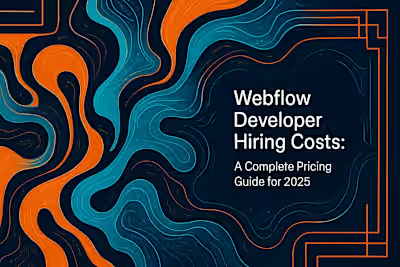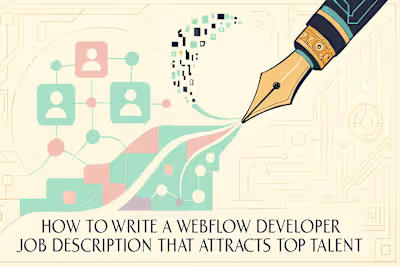Freelance Webflow Developer vs. Webflow Agency: Which is Best for Your Project?

Freelance Webflow Developer vs. Webflow Agency: Which is Best for Your Project?
Understanding the Core Differences
Freelance Webflow Developer
Webflow Agency
Pros of Hiring a Freelance Webflow Developer
Cost-Effectiveness
Direct Communication and Personalized Service
Flexibility and Agility
Specialized Niche Expertise
Cons of Hiring a Freelance Webflow Developer
Limited Bandwidth and Availability
Reliance on a Single Individual
Potentially Narrower Skill Set
Pros of Hiring a Webflow Agency
Access to a Team of Experts
Capacity for Larger, More Complex Projects
Established Processes and Project Management
Potentially Broader Service Offerings
Cons of Hiring a Webflow Agency
Higher Costs
Less Direct Communication
Potentially Less Flexibility
Key Questions to Ask Yourself Before Deciding
What is the scope and complexity of my project?
What is my budget?
How much involvement do I want in the project?
What is my timeline?
Do I need ongoing support and a broad range of services?
Making the Right Choice for Your Business
When a Freelancer Shines
When an Agency is the Way to Go
References
Freelance Webflow Developer vs. Webflow Agency: Which is Best for Your Project?
Understanding the Core Differences
Freelance Webflow Developer
Webflow Agency
Pros of Hiring a Freelance Webflow Developer
Cost-Effectiveness
Direct Communication and Personalized Service
Flexibility and Agility
Specialized Niche Expertise
Cons of Hiring a Freelance Webflow Developer
Limited Bandwidth and Availability
Reliance on a Single Individual
Potentially Narrower Skill Set
Pros of Hiring a Webflow Agency
Access to a Team of Experts
Capacity for Larger, More Complex Projects
Established Processes and Project Management
Potentially Broader Service Offerings
Cons of Hiring a Webflow Agency
Higher Costs
Less Direct Communication
Potentially Less Flexibility
Key Questions to Ask Yourself Before Deciding
What is the scope and complexity of my project?
What is my budget?
How much involvement do I want in the project?
What is my timeline?
Do I need ongoing support and a broad range of services?
Making the Right Choice for Your Business
When a Freelancer Shines
When an Agency is the Way to Go
References
Posted Jun 12, 2025
Deciding between a freelance Webflow developer and a Webflow agency? Explore the pros, cons, and key considerations to make the right choice for your needs and budget.









